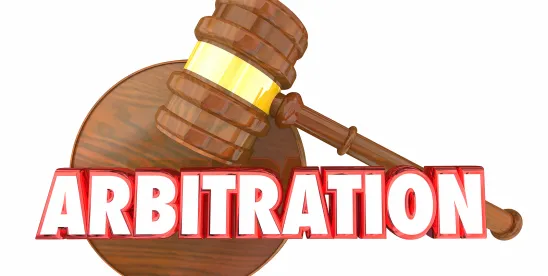The California Supreme Court’s decision in Hohenshelt v. Superior Court marks an important moment for arbitration in California, particularly in the context of consumer disputes, employment disputes, and mass arbitrations.
As we previewed before and discussed after the oral argument, at issue was the fate of California’s strict 30-day arbitration fee payment rule, Code of Civil Procedure section 1281.98, a statute that has become a flashpoint in the ongoing battle over arbitration gamesmanship and the enforceability of arbitration agreements. In recent years, businesses—especially those with online operations—have faced a surge of mass arbitration demands, often orchestrated by law firms representing large numbers of claimants, many of whom are not genuine customers but “litigation testers.” The high administrative costs and the risk of losing the right to arbitrate over a missed payment deadline have created significant pressure on businesses to settle even questionable claims.
On August 11, 2025, the California Supreme Court held that the 30-day arbitration fee payment rule is not preempted by the Federal Arbitration Act (“FAA”), but, crucially, it cannot be applied in a rigid, automatic fashion. The decision brings clarity to a landscape that has been marked by conflicting rulings and significant uncertainty for businesses facing mass arbitration demands.
The Issue Before the Court: FAA Preemption and the 30-Day Rule
The central question before the Court was whether the FAA preempts California’s section 1281.98, which deems a business in “material breach” of an arbitration agreement if it fails to pay arbitration fees within 30 days of the issuance an invoice, allowing the claimant to withdraw from arbitration and proceed in court. Under a strict reading of the statute, even minor or inadvertent delays could result in the loss of the right to arbitrate and exposure to attorneys’ fees and costs. The legal uncertainty has led to inconsistent outcomes in the lower courts, with some enforcing the rule rigidly and others finding it preempted by federal law.
The California Supreme Court, in a majority opinion authored by Justice Liu, held that section 1281.98 is not preempted by the FAA, but with a significant clarification that reshapes the statute’s application. The Court rejected the inflexible, “hair-trigger” approach previously adopted by some appellate courts. Instead, it held that section 1281.98 must be interpreted in harmony with longstanding California legal principles that allow relief from forfeiture in cases of “good faith mistake, inadvertence, or other excusable neglect.” The majority emphasized that the statute’s purpose is to deter strategic nonpayment of arbitration fees—such as a party intentionally stalling or blocking arbitration for strategic reasons—not to penalize honest mistakes or minor administrative errors. Under this construction, a respondent that misses a payment deadline due to a good faith mistake or excusable neglect may be excused from forfeiture of its right to arbitrate. The Court disapproved prior appellate decisions to the extent they imposed an inflexible, no-excuses rule.
Justice Groban, joined by Justice Evans, concurred to highlight an additional threshold issue: whether the parties’ arbitration agreement expressly or by default incorporates California’s procedural rules. The concurrence noted that, in most cases, California procedural rules will apply by default unless the parties clearly opt out, and that the application of section 1281.98 is often a matter of enforcing the parties’ contract rather than a question of FAA preemption.
In dissent, Justice Corrigan, joined by Justice Jenkins, argued that even as interpreted by the majority, section 1281.98 still imposes special, disfavored treatment on arbitration agreements, contrary to the FAA’s equal-treatment principle. The dissent maintained that the statute’s presumption that “time is of the essence” for arbitration fee payments, and its strict consequences for late payment, are not found in general contract law and thus should be preempted.
Implications for Businesses, Mass Arbitrations, and Future Practice
The Hohenshelt decision brings clarity to the administration of arbitration agreements in California. Strict, automatic forfeiture for late payment is not the rule. Businesses that miss the 30-day deadline due to good faith mistake, inadvertence, or excusable neglect may seek relief from forfeiture. At the same time, the statute retains its force against strategic or willful nonpayment, which may be a material breach and can result in loss of the right to arbitrate and the imposition of sanctions.
The decision is particularly significant in the context of mass arbitrations. Plaintiffs’ firms have increasingly used the threat of mass arbitration filings—and the associated fee exposure—as leverage to extract settlements, regardless of the merits of the underlying claims. By clarifying that honest mistakes or minor administrative errors will not automatically result in forfeiture of the right to arbitrate, the Supreme Court’s decision reduces the leverage that mass arbitration claimants can wield based solely on technical defaults. However, the decision does not eliminate the risks associated with mass arbitrations, as businesses must still act promptly and in good faith to avoid strategic nonpayment findings.
Additionally, parties to arbitration agreements can incorporate flexibility into their arbitration agreements: they can specify their own payment timelines in their contracts, and they can agree to extensions as needed. The risk of catastrophic loss of arbitral rights for minor or excusable errors is now reduced, but businesses must still be vigilant about timely payment and have robust internal processes for managing arbitration fee payments.
Procedural questions regarding the applicability of California’s rules can sometimes turn on the language of the arbitration agreement. Businesses should review and, if necessary, revise their arbitration agreements to clarify payment timelines and procedures for extensions. If a payment is missed, businesses should promptly assess whether relief from forfeiture is available.
Conclusion
The Hohenshelt decision is a potentially important ruling for arbitration in California. While the Court found that California’s 30-day rule was not preempted by the FAA, it ensures that honest mistakes do not result in disproportionate penalties. The decision provides a more balanced framework for resolving disputes over arbitration fee payments, reducing the risk of unfair forfeiture and bringing greater predictability to the arbitration process. All parties involved in California arbitrations—especially those facing risk of consumer arbitrations or mass arbitration demands—should consider adapting their practices to ensure compliance and minimize risk, including by modifying their arbitration provisions to provide additional time in which to pay arbitral fees.






 />i
/>i
